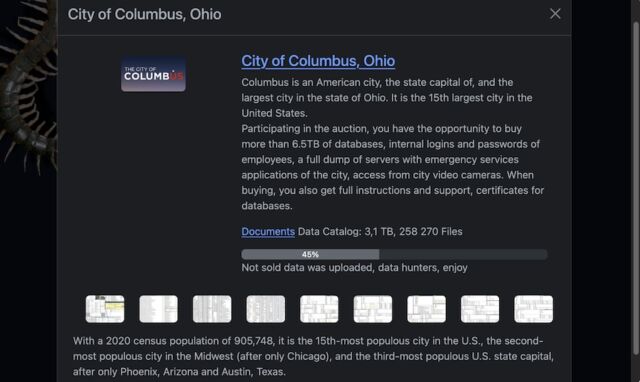
A judge in Ohio has issued a temporary restraining order against a security researcher who presented evidence that a recent ransomware attack on the city of Columbus scooped up reams of sensitive personal information, contradicting claims made by city officials.
The order, issued by a judge in Ohio’s Franklin County, came after the city of Columbus fell victim to a ransomware attack on July 18 that siphoned 6.5 terabytes of the city’s data. A ransomware group known as Rhysida took credit for the attack and offered to auction off the data with a starting bid of about $1.7 million in bitcoin. On August 8, after the auction failed to find a bidder, Rhysida released what it said was about 45 percent of the stolen data on the group’s dark web site, which is accessible to anyone with a TOR browser.
Dark web not readily available to public—really?
Columbus Mayor Andrew Ginther said on August 13 that a “breakthrough” in the city’s forensic investigation of the breach found that the sensitive files Rhysida obtained were either encrypted or corrupted, making them “unusable” to the thieves. Ginther went on to say the data’s lack of integrity was likely the reason the ransomware group had been unable to auction off the data.
Shortly after Ginther made his remarks, security researcher David Leroy Ross contacted local news outlets and presented evidence that showed the data Rhysida published was fully intact and contained highly sensitive information regarding city employees and residents. Ross, who uses the alias Connor Goodwolf, presented screenshots and other data that showed the files Rhysida had posted included names from domestic violence cases and Social Security numbers for police officers and crime victims. Some of the data spanned years.
On Thursday, the city of Columbus sued Ross for alleged damages for criminal acts, invasion of privacy, negligence, and civil conversion. The lawsuit claimed that downloading documents from a dark web site run by ransomware attackers amounted to him “interacting” with them and required special expertise and tools. The suit went on to challenge Ross alerting reporters to the information, which ii claimed would not be easily obtained by others.
“Only individuals willing to navigate and interact with the criminal element on the dark web, who also have the computer expertise and tools necessary to download data from the dark web, would be able to do so,” city attorneys wrote. “The dark web-posted data is not readily available for public consumption. Defendant is making it so.”
The same day, a Franklin County judge granted the city’s motion for a temporary restraining order against Ross. It bars the researcher “from accessing, and/or downloading, and/or disseminating” any city files that were posted to the dark web. The motion was made and granted “ex parte,” meaning in secret before Ross was informed of it or had an opportunity to present his case.
In a press conference Thursday, Columbus City Attorney Zach Klein defended his decision to sue Ross and obtain the restraining order.
“This is not about freedom of speech or whistleblowing,” he said. “This is about the downloading and disclosure of stolen criminal investigatory records. This effect is to get [Ross] to stop downloading and disclosing stolen criminal records to protect public safety.”
The Columbus city attorney’s office didn’t respond to questions sent by email. It did provide the following statement:
The lawsuit filed by the City of Columbus pertains to stolen data that Mr. Ross downloaded from the dark web to his own, local device and disseminated to the media. In fact, several outlets used the stolen data provided by Ross to go door-to-door and contact individuals using names and addresses contained within the stolen data. As has now been extensively reported, Mr. Ross also showed multiple news outlets stolen, confidential data belonging to the City which he claims reveal the identities of undercover police officers and crime victims as well as evidence from active criminal investigations. Sharing this stolen data threatens public safety and the integrity of the investigations. The temporary restraining order granted by the Court prohibits Mr. Ross from disseminating any of the City’s stolen data. Mr. Ross is still free to speak about the cyber incident and even describe what kind of data is on the dark web—he just cannot disseminate that data.
Attempts to reach Ross for comment were unsuccessful. Email sent to the Columbus mayor’s office went unanswered.

As shown above in the screenshot of the Rhysida dark web site on Friday morning, the sensitive data remains available to anyone who looks for it. Friday’s order may bar Ross from accessing the data or disseminating it to reporters, but it has no effect on those who plan to use the data for malicious purposes.

